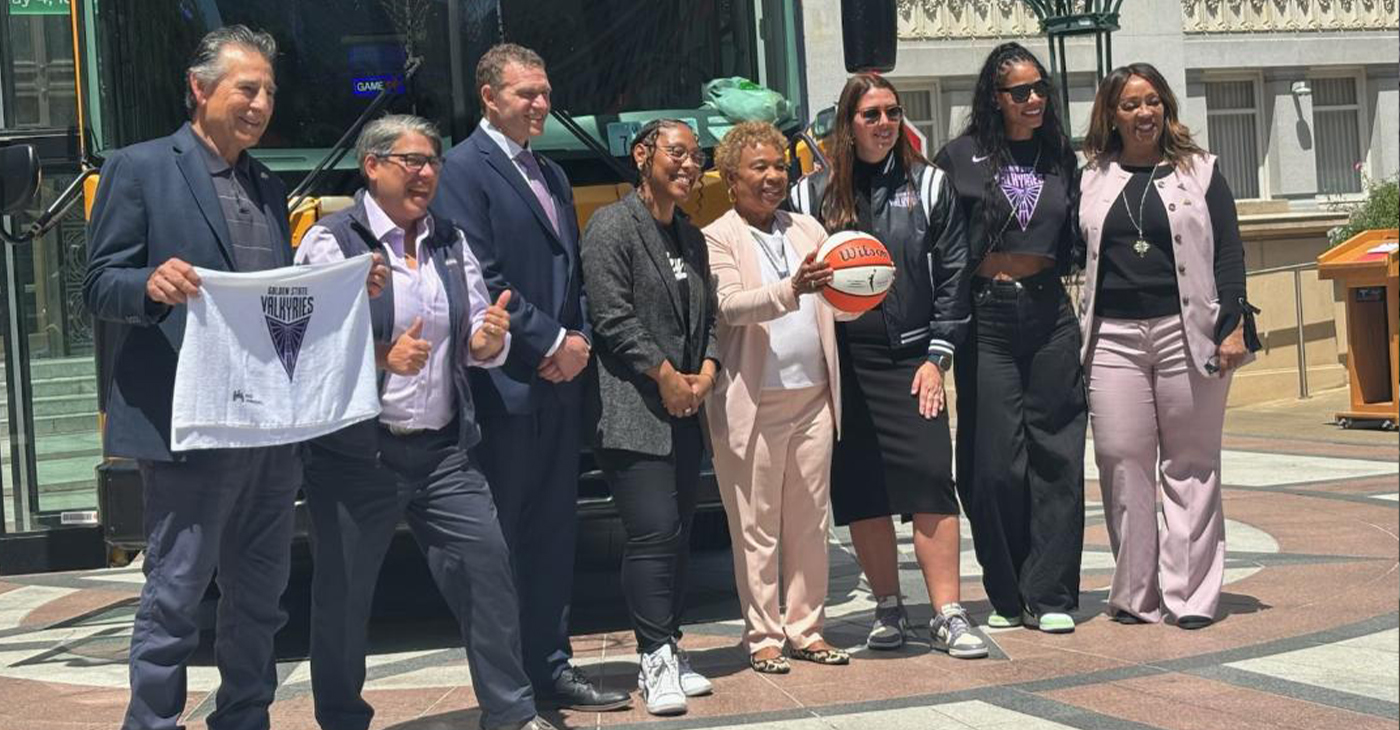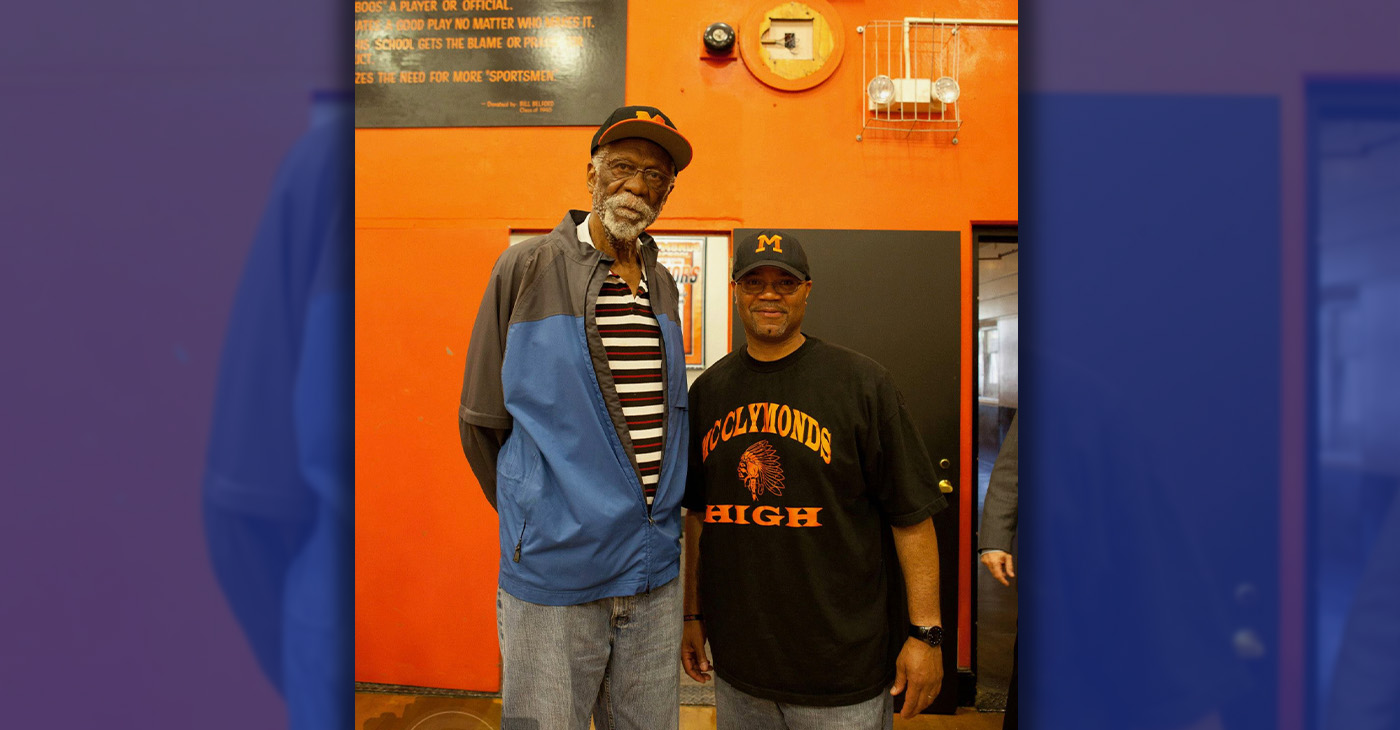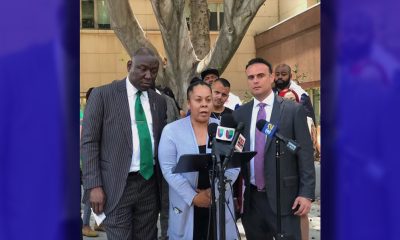Sports
Judge Rules for Peterson, Opening Door for Reinstatement

In this Nov. 4, 2014, file photo, Minnesota Vikings running back Adrian Peterson leaves the courthouse with his wife Ashley Brown Peterson in Conroe, Texas. A federal judge has cleared the way for Peterson to be reinstated. U.S. District Judge David Doty issued his order Thursday, Feb. 26, 2015, less than three weeks after hearing oral arguments. (AP Photo/Pat Sullivan, File)
DAVE CAMPBELL, AP Sports Writers
JON KRAWCZYNSKI, AP Sports Writers
In NFL limbo for the last five-plus months, Adrian Peterson’s future with the Minnesota Vikings is still in question.
The path toward resolution of his status has been cleared. The league-union clash over the personal conduct policy, though, has only cranked up.
Commissioner Roger Goodell and the NFL were handed a second high-profile legal defeat Thursday, when U.S. District Judge David Doty overruled league arbitrator Harold Henderson’s December denial of the six-time Pro Bowl running back’s appeal.
Doty ruled that Henderson “failed to meet his duty” in considering Peterson’s punishment, for the child abuse charge that brought national backlash for the league on the heels of the bungled handling of the assault case involving former Baltimore Ravens running back Ray Rice.
Doty said the league cannot retroactively apply the standards of its new, tougher personal conduct policy to an action by Peterson that occurred before the policy was in place. The league suspended Peterson through at least April 15 under the new standard that arose from the furor over the handling of the assault involving Rice. But Doty said in his 16-page ruling that Henderson “simply disregarded the law of the shop and in doing so failed to meet his duty” under the collective bargaining agreement.
NFL Players Association executive director DeMaurice Smith said in a statement Doty’s decision was a “victory for the rule of law, due process and fairness.”
The injuries to Peterson’s son, delivered by a wooden switch that Peterson was using for discipline, occurred more than three months before Goodell’s announcement of the increase in suspension time from two games to six games for players involved in domestic violence.
“Our collective bargaining agreement has rules for implementation of the personal conduct policy and when those rules are violated, our union always stands up to protect our players’ rights,” Smith said. “This is yet another example why neutral arbitration is good for our players, good for the owners and good for our game.”
The NFL promptly filed its protest to the 8th Circuit Court of Appeals. The league also returned Peterson to the exempt list he spent two months on last season pending completion of the process. The NFL also said further arbitration proceedings in front of Henderson could be held before an appeal is heard by the 8th Circuit.
“Judge Doty’s order did not contain any determinations concerning the fairness of the appeals process under the CBA, including the commissioner’s longstanding authority to appoint a designee to act as hearing officer,” NFL spokesman Brian McCarthy said. “Even so, we believe strongly that Judge Doty’s order is incorrect and fundamentally at odds with well-established legal precedent governing the district court’s role in reviewing arbitration decisions.”
The Vikings chimed in a little later with moral support of Peterson, whom they have heaped praise on in recent weeks in obvious attempt to either welcome him back or enhance his trade value.
“Adrian Peterson is an important member of the Minnesota Vikings, and our focus remains on welcoming him back when he is able to rejoin our organization,” the Vikings said. “Today’s ruling leaves Adrian’s status under the control of the NFL, the NFLPA and the legal system, and we will have no further comment at this time.”
Peterson’s return to the exempt list was just as critical of a development in this saga as was Doty’s ruling. Being on the exempt list means the Vikings can now have direct contact with Peterson, which they couldn’t while the suspension was in effect. Also, when the market opens March 10, they’d be allowed to trade him if they wanted. They could release him or try to restructure his contract at any time.
Peterson was unavailable for comment. His agent, Ben Dogra of Relativity Sports, said he was pleased Doty “recognized the merits” of Peterson’s case.
“This is an important moment for Adrian, players’ rights and the NFLPA. Adrian is an exceptional community member, father, husband and athlete who will continue to contribute meaningfully on and off the field,” Dogra said in a statement sent to The Associated Press. “Any NFL team will be fortunate to have Adrian on its roster as he will consistently serve as a strong leader and impactful performer.”
Peterson’s existing deal is through 2017, carrying a $15.4 million salary cap hit for 2015. If the Vikings cut him, they’d owe him no more money and take only a $2.4 million hit to their salary cap. Peterson has no contractual leverage, but he has expressed uneasiness about returning to the only team he’s ever played for. He told ESPN in a recent interview that he felt betrayed by some members of the organization during the process in which Goodell placed him on the exempt list, essentially paid leave, while the child-abuse case played out in court in Texas.
Doty’s courtroom has long been a ground zero of sorts for NFL labor matters, and his ruling pattern has favored the union more often than not.
Still, his latest rebuke of the NFL came as a surprise because it defied a collectively bargained arbitration process.
“There’s no doubt that generally speaking judges don’t like to overturn decisions of arbitrators,” said Thomas Wassel, a labor and employment attorney and partner at Cullen and Dykman in New York. “That’s a general principle in all of labor law.”
___
AP NFL websites: http://www.pro32.ap.org and http://www.twitter.com/AP_NFL
Copyright 2015 The Associated Press. All rights reserved. This material may not be published, broadcast, rewritten or redistributed.
Alameda County
Seth Curry Makes Impressive Debut with the Golden State Warriors
Seth looked comfortable in his new uniform, seamlessly fitting into the Warriors’ offensive and defensive system. He finished the night with an impressive 14 points, becoming one of the team’s top scorers for the game. Seth’s points came in a variety of ways – floaters, spot-up three-pointers, mid-range jumpers, and a handful of aggressive drives that kept the Oklahoma City Thunder defense on its heels.

By Y’Anad Burrell
Tuesday night was anything but ordinary for fans in San Francisco as Seth Curry made his highly anticipated debut as a new member of the Golden State Warriors. Seth didn’t disappoint, delivering a performance that not only showcased his scoring ability but also demonstrated his added value to the team.
At 35, the 12-year NBA veteran on Monday signed a contract to play with the Warriors for the rest of the season.
Seth looked comfortable in his new uniform, seamlessly fitting into the Warriors’ offensive and defensive system. He finished the night with an impressive 14 points, becoming one of the team’s top scorers for the game. Seth’s points came in a variety of ways – floaters, spot-up three-pointers, mid-range jumpers, and a handful of aggressive drives that kept the Oklahoma City Thunder defense on its heels.
One of the most memorable moments of the evening came before Seth even scored his first points. As he checked into the game, the Chase Center erupted into applause, with fans rising to their feet to give the newest Warrior a standing ovation.
The crowd’s reaction was a testament not only to Seth’s reputation as a sharpshooter but also to the excitement he brings to the Warriors. It was clear that fans quickly embraced Seth as one of their own, eager to see what he could bring to the team’s championship aspirations.
Warriors’ superstar Steph Curry – Seth’s brother – did not play due to an injury. One could only imagine what it would be like if the Curry brothers were on the court together. Magic in the making.
Seth’s debut proved to be a turning point for the Warriors. Not only did he contribute on the scoreboard, but he also brought a sense of confidence and composure to the floor.
While their loss last night, OKC 124 – GSW 112, Seth’s impact was a game-changer and there’s more yet to come. Beyond statistics, it was clear that Seth’s presence elevated the team’s performance, giving the Warriors a new force as they look to make a deep playoff run.
Barbara Lee
WNBA’s Golden State Valkyries Kick Off Season with Community Programs in Oakland
“The Golden State Valkyries are more than a team—they’re a movement,” said Oakland Interim-Mayor Kevin Jenkins. “Their touchdown in Oakland marks a new era of opportunity, inspiration, and equity in sports. This partnership reflects our city’s deep commitment to uplifting women, investing in youth, and building a community where every dream has a place to grow. We’re proud to welcome the Valkyries to The Town.”

Team installs new nets at playgrounds, holds flag-raisings at City Halls in Oakland and S.F.
Special to The Post
The Golden State Valkyries brought the excitement of their inaugural season to every corner of the Bay Area with a full slate of community celebrations leading up to their historic home-opener against the Los Angeles Sparks at the Chase Center in San Francisco on Friday.
The week featured flag-raising ceremonies at city halls in Oakland and San Francisco, three “Violet Net” installation days at Oakland parks to encourage basketball play, fun “Hoopbus” takeovers at multiple schools presented by Kaiser Permanente, and player appearances.
“The Golden State Valkyries are more than a team—they’re a movement,” said Oakland Interim-Mayor Kevin Jenkins. “Their touchdown in Oakland marks a new era of opportunity, inspiration, and equity in sports. This partnership reflects our city’s deep commitment to uplifting women, investing in youth, and building a community where every dream has a place to grow. We’re proud to welcome the Valkyries to The Town.”
In total, 90 violet nets were installed on 45 basketball courts across 34 public parks throughout Oakland this week. A list of the parks receiving violet nets can be found at Valkyries.com.
About the Golden State Valkyries
The Golden State Valkyries, the WNBA affiliate of the seven-time NBA Champion Golden State Warriors, were announced as the 13th WNBA franchise on Oct. 5, 2023. According to Norse mythology, Valkyries are a host of warrior women who are fearless and unwavering – flying through air and sea alike.
This brand is Golden State’s modern interpretation of Valkyries: strong, bold, and fierce. Tipping off during the 2025 WNBA season, the team is headquartered in Oakland and will play home games at Chase Center in San Francisco. For Golden State Valkyries’ assets, including team logos, visit valkyries.com.
Activism
McClymonds High Names School Gym for Star Graduate, Basketball Legend Bill Russell
William “Bill” Felton Russell was born on Feb. 12, 1934, and died on July 31, 2022. He achieved fame as a U.S. professional basketball player who played center for the Boston Celtics of the National Basketball Association (NBA) from 1956 to 1969. He was the centerpiece of the Celtics dynasty that won 11 NBA championships during his 13-year career.

By Ken Epstein
West Oakland’s McClymonds High School, “the School of Champions,” this week named the school’s gymnasium in honor of one of its most famous graduates, basketball legend Bill Russell (class of ’52).
William “Bill” Felton Russell was born on Feb. 12, 1934, and died on July 31, 2022. He achieved fame as a U.S. professional basketball player who played center for the Boston Celtics of the National Basketball Association (NBA) from 1956 to 1969. He was the centerpiece of the Celtics dynasty that won 11 NBA championships during his 13-year career.
Russell is widely known as one of the greatest basketball players of all time. In 2011, he received the Presidential Medal of Freedom, the country’s highest civil honor, from President Barack Obama for Russell’s contributions to basketball and the Civil Rights Movement.
The McClymonds’ naming ceremony was held on Wednesday, the same day as Russell’s birthday. Oakland leader Bill Patterson, a longtime friend of Russell’s, was scheduled to cut the ribbon at the reopening of the gym, which had been closed for several months for renovation. Russell’s daughter Karen was scheduled to attend the ribbon cutting.
Russell’s name and signature are now printed on the gymnasium floor.
Patterson was working at DeFremery Park when he met Russell. “I befriended him as a boy and during his years at University of San Francisco” said Patterson. “We stayed friends for the rest of his life.”
Said McClymonds Principal Darielle Davis, herself a McClymonds graduate, “We are excited to honor Bill Russell for his sports accolades and because he broke color barriers. He is part of our legacy, and legacy is really important at McClymonds.”
Brian McGhee, community schools manager at McClymonds and former football player at UC Berkeley, said that Russell meant a lot to him and others at the school. “He was a beacon of light and hope for West Oakland,” he said. “He did a lot for sports and for civil rights.”
Starting in 2018, Ben “Coach” Tapscott worked with Patterson and other McClymonds grads, community members, and former coaches to encourage the Oakland Board of Education to endorse the naming of the school gym, which finally happened recently.
“We worked hard to make this happen,” said Tapscott. “He’s an important part of McClymond’s history, along with a lot of other famous graduates,” he said.
-

 Activism3 weeks ago
Activism3 weeks agoOakland Post: Week of November 12 – 18, 2025
-

 Activism4 weeks ago
Activism4 weeks agoOakland Post: Week of November 5 – 11, 2025
-

 Activism2 weeks ago
Activism2 weeks agoIN MEMORIAM: William ‘Bill’ Patterson, 94
-

 Activism3 weeks ago
Activism3 weeks agoHow Charles R. Drew University Navigated More Than $20 Million in Fed Cuts – Still Prioritizing Students and Community Health
-

 #NNPA BlackPress3 weeks ago
#NNPA BlackPress3 weeks agoThe Perfumed Hand of Hypocrisy: Trump Hosted Former Terror Suspect While America Condemns a Muslim Mayor
-

 Bay Area3 weeks ago
Bay Area3 weeks agoNo Justice in the Justice System
-

 #NNPA BlackPress3 weeks ago
#NNPA BlackPress3 weeks agoProtecting Pedophiles: The GOP’s Warped Crusade Against Its Own Lies
-

 #NNPA BlackPress2 weeks ago
#NNPA BlackPress2 weeks agoTrump’s Death Threat Rhetoric Sends Nation into Crisis




























































